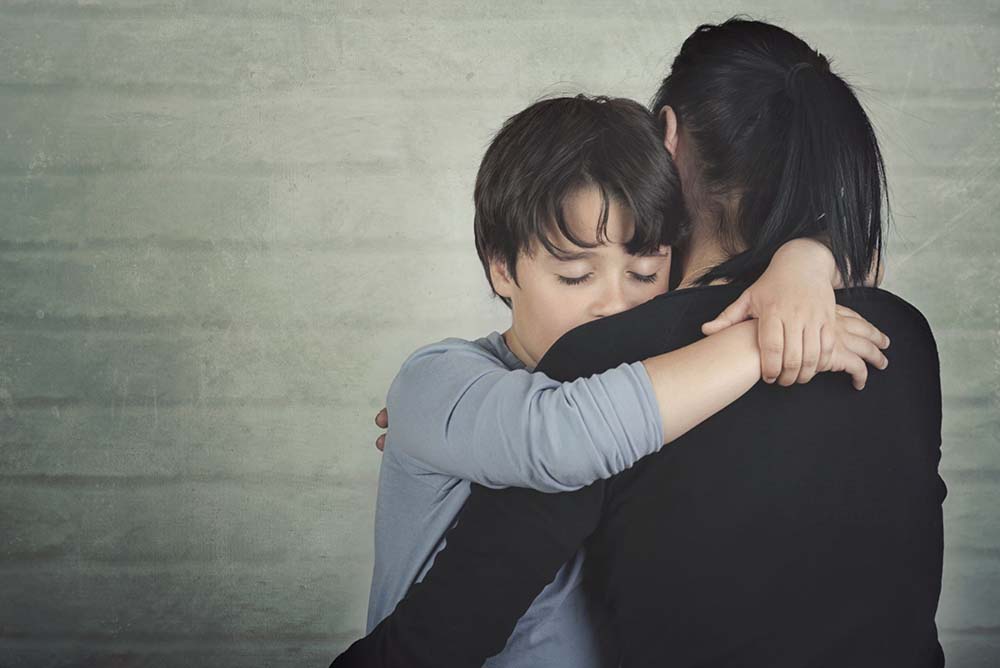How to Explain the Loss of a Loved One to a Child
- September 20, 2021

The loss of a loved one is one of life’s most emotionally challenging experiences. Adults often have some experience with life’s ups and downs, but children may not yet understand death or grief. When tasked with explaining such news to a child, the challenge can feel overwhelming.
As parents, grandparents, or guardians, it is sometimes necessary to communicate difficult news to children. Here are some helpful tips and recommendations to establish a healthy foundation for a child’s understanding of death, aiding both the child and the adult in coping through the grief process.
How Can You Explain Death to a Child?
Here are a few recommendations and guidelines for explaining the concept of death and the loss of a loved one to a child.
Consider Their Age and Developmental Level
Understanding death is complex and abstract, making it hard for children to grasp. Different ages allow for different levels of comprehension. Preschoolers may use imagination to explain death, while middle schoolers can understand it more solidly. Structure the news delivery to cater to the child’s age and developmental level.
Should You Include All the Details?
Death is difficult for a child to understand. Avoid delving deeply into the details of how a loved one passed away, as this may cause unnecessary trauma. They are just becoming familiar with the concept of death, so keep your explanation and answers to their questions as simple as possible.
How Can You Control Your Emotions?
Remaining calm while explaining death to a child is important. Talking about death while crying or emotionally overwhelmed can impact a child’s understanding and adaptation to the news. Communicate with your child after calming down to process the information effectively.
Create a Safe and Comforting Space
The environment in which you deliver difficult news can affect how well a child handles the information. It’s important for your child to feel comfortable and empowered to express their emotions. Encourage them to share their feelings and let them know it’s okay to express emotions. Choose a familiar, comfortable environment without distractions, using toys to provide comfort.
How Should You Respond to Their Questions?
Expect questions from your child about death and the loss of a loved one. Avoid vague answers and provide honest, comforting, and simple responses. Compassionate and understanding answers help them avoid feeling confused or pressured.
Be There for Your Child
Your child’s worldview changes with the loss of a loved one. Give them time to grasp the difficult news and adjust to the situation. They may need time to process and cope. Consider activities like going to the park, enjoying ice cream, or watching a show together. Being present to provide comfort and support is essential.
What Comes After Someone Passes Away?
Explain the rituals and traditions that follow a loved one’s death, such as funerals and memorial services. If your child hasn’t attended a funeral, explain what it involves to help them understand the upcoming events.
Is It Okay to Say “I Don’t Know”?
Death is complex, and no one has all the answers. As your child grows, they will learn to accept the unknowns of death. Be honest with your child if you don’t have all the answers. Let them know your love and support are constants they can rely on.
Let Your Child Process in Their Own Way
Accept whatever reaction your child has to the news. You both will experience a grieving process, so give yourselves grace and patience to react and behave naturally. Foster healthy communication, letting your child know there is no one right way to feel or behave in this situation.
How Can You Find an Obituary for a Specific Person?
If you are looking to find an obituary for a loved one, there are several resources available. Online databases, local newspapers, and funeral home websites are good starting points. This can also provide closure and additional details about memorial services. You can learn more in our guide on how to find an obituary for a specific person.
We All Experience Grief Differently
We hope this guide offers support and reassurance during this difficult time. Grief is unique and complex, and some children might need long-term support to cope with their feelings. Ultimately, how your child handles the news depends on many factors, including their relationship with the deceased and the surrounding support.
Death is an inevitability of life, and teaching children about it is necessary. By approaching the situation with patience, love, and compassion, you can provide comfort to your child and help them understand and accept death and the loss of a loved one.
FAQs
How do you explain death to a preschooler?
Preschoolers view life magically. Use simple language and imagination-based explanations to help them understand.
What should you avoid saying when explaining death to a child?
Avoid providing excessive details and vague answers. Instead, be honest and comforting in your responses.
How can you comfort a child grieving a loved one?
Create a safe, comforting space. Allow them to express emotions and provide reassurance and support.
Should a child attend a funeral?
Explain what a funeral involves and decide based on the child’s age and emotional readiness.
What if a child asks questions you can’t answer?
It’s okay to say, “I don’t know.” Honesty and support are key in such situations.
Sign Up For Our
Newsletter
Each day, we honor and remember those who have recently passed away.
Most Viewed
More
- Article Obituaries
- Celebrities
- Celebrity News
- Local
- News
- News & Advice
- NFL
- NHL
- Northside
- Norwin
- Obituaries
- Obituary
- Penn Hills
- Pirates
- Pitt
- Pittsburgh
- Plum
- Politics Election
- Premium Memorial
- Sports
- Steelers
- Theater Arts
- Top Stories
- Travel
- Tribune Review Obituaries
- US-World
- Valley News Dispatch
- West End
- Westmoreland
- World